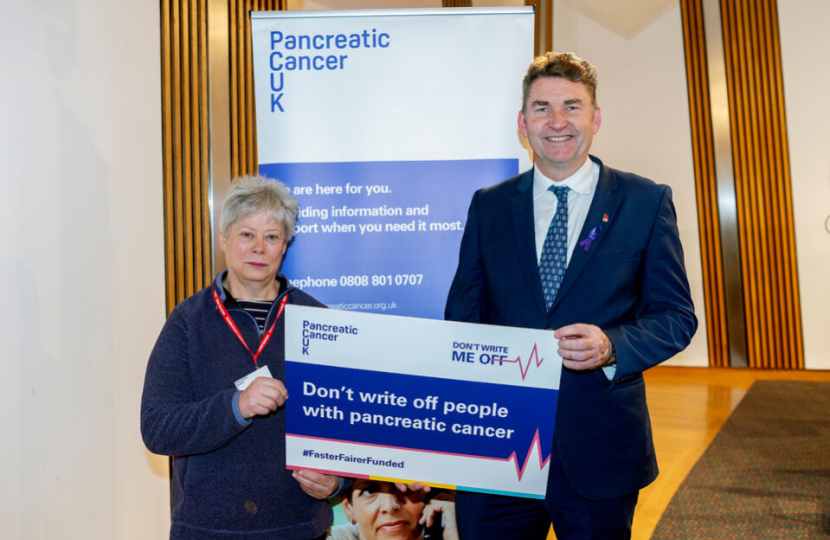
Brian Whittle MSP has pledged his support to Pancreatic Cancer UK’s campaign to reverse shockingly low treatment rates for the disease. Currently 7 in 10 people receive no treatment at all – not even chemotherapy. Through its ‘Don’t Write Me Off’ campaign, the charity is urging the Scottish Government to fund a new, faster and fairer pathway to give all patients the best chance of survival and quality of life.
At an event in Holyrood on Thursday 2nd November, Brian heard how Pancreatic cancer currently has the lowest treatment rate (34%) of any common cancer - comparing poorly with treatment rates for breast (86%), bowel (74%) and lung (56%), cancers. Just 10% of those diagnosed with the disease receive surgery, the only potentially curative treatment. Only a quarter of patients receive life-extending chemotherapy. As a result, more than half of people with pancreatic cancer die within three months of diagnosis.
Patients are often waiting too long for a confirmed diagnosis and for treatment to begin because of challenges in coordination between different healthcare teams; and significant staff shortages across almost every role connected to cancer. While people wait the cancer can spread, and their health deteriorate, leaving them ineligible for treatment they might otherwise have received. Due to a lack of coordination they are often discharged back into the community with a lack of support in place.
Around 900 people are diagnosed with pancreatic cancer in Scotland every year.
Brian Whittle MSP said: “For people affected by pancreatic cancer the impact of the tremendous pressures on the NHS can be heart-breaking.
“Time is truly of the essence with this devastating disease. Yet, while we have seen significant improvements in the diagnosis, treatment and awareness of many cancers, progress on pancreatic cancer has been unacceptably slow.
“I want to see Government and services across the country act now to transform survival for this devastating disease and hope everyone in South Scotland will join me in backing this campaign.”
Pancreatic Cancer UK has designed the first improved care pathway for the disease in partnership with 300 health professionals and patient representatives. The charity’s analysis shows that if the pathway was implemented now, then by 2028:
- Overall treatment rates for people with pancreatic cancer could more than double from 3 in 10 people receiving treatment to 6 in 10
- Survival rates would increase from 7.1% to 10.4% by 2028 - the biggest improvement in 50 years
- Over the next five years, almost 5,000 (4,940) people could have a chance to live longer
Scotland is currently the only UK nation that has committed in its national cancer strategy to focus on speeding up diagnosis and improving survival for pancreatic and other less survivable cancers. Through its ‘Don’t Write Me Off’ campaign, the charity is calling on Scotland to deliver on its commitment to roll out diagnostic pathways for cancers with vague and non-specific symptoms as quickly as possible. Pancreatic Cancer UK is calling on all governments across the UK to urgently implement and fund the improved care pathway to ensure future patients experience a diagnosis, treatment and care journey that is:
- Faster: With diagnosis within 21 days of being sent for tests, and treatment within 21 days of diagnosis.
- Fairer: With expert care and support for everyone, no matter where they live, or their chance of survival.
- Funded: With sustained government funding to make these changes possible, so more people can be saved.
For more information visit: https://www.pancreaticcancer.org.uk/dont-write-me-off/
Dawn Crosby, Head of Devolved Nations at Pancreatic Cancer UK, said: “We’re extremely grateful that Brian has shown his support for our ‘Don’t Write Me Off’ campaign.
“For 7 in 10 people with pancreatic cancer to receive no treatment at all – not even chemotherapy - is shocking. The path from diagnosis to treatment must be faster, more efficient and encompass all aspect of a person’s care. Nobody should ever feel written off - regardless of whether their cancer is operable or not.
“The Improved Care Pathway represents the consensus of hundreds of health professionals and people affected by the disease who all care deeply about patients, wherever they live, having the best possible chance of survival and as much precious time with their loved ones. Scotland has taken the vital first step towards improving survival for people with pancreatic cancer and other less survivable cancers through its national cancer strategy and it’s funding of the Pancreatic Cancer Diagnostic Pathway Improvement Project pilot. It now must embed this and deliver on their commitments to speed up diagnosis and improve quality of life for pancreatic patients.”

